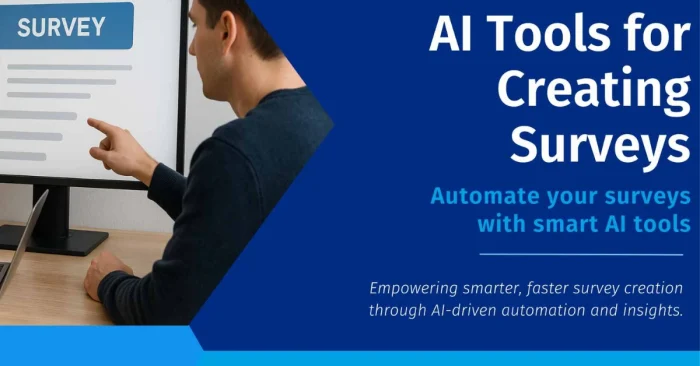Overview
AI tools for customer surveys help businesses, marketers, and product teams collect, analyze, and act on feedback efficiently. These tools automate survey creation, distribution, and response analysis, providing actionable insights in real time. By leveraging AI, companies can understand customer preferences, identify pain points, and improve products or services. AI-powered surveys adapt to respondents, ask relevant follow-up questions, and detect sentiment from text responses. Organizations can segment audiences, track trends, and make data-driven decisions with minimal manual effort. AI enhances survey accuracy, increases response rates, and ensures meaningful feedback for continuous business improvement and customer satisfaction.
1. AI for Survey Creation
AI generates tailored survey questions based on business goals, audience profiles, and previous responses. This ensures that surveys are relevant, engaging, and capture useful data without extensive manual effort from teams.
2. AI in Distribution Automation
AI tools schedule and send surveys across multiple channels like email, SMS, or apps. Automated distribution ensures higher participation rates and timely feedback collection without overburdening staff.
3. AI for Adaptive Questioning
AI dynamically adjusts survey questions based on previous answers. This personalization improves respondent engagement and ensures that the feedback collected is meaningful and contextually relevant.
4. AI in Sentiment Analysis
AI analyzes open-text responses to detect emotions, opinions, and satisfaction levels. Sentiment insights help businesses understand customer feelings and identify areas for improvement effectively.
5. AI for Data Analysis
AI tools process large volumes of survey data, identify patterns, and generate actionable insights. This reduces manual work and allows decision-makers to focus on strategy rather than data compilation.
6. AI in Customer Segmentation
AI categorizes respondents based on demographics, behavior, or preferences. Segmentation enables businesses to target specific groups with tailored solutions and improve engagement with different customer segments.
7. AI for Predictive Insights
AI predicts future trends based on survey responses and historical data. These insights help companies anticipate customer needs, plan product updates, and make proactive business decisions.
8. AI in Reporting & Visualization
AI generates visual dashboards and reports that summarize survey results. Interactive charts, graphs, and trends make it easy to interpret data and communicate findings across teams.
9. AI for Response Rate Optimization
AI identifies the best time and channel to reach respondents, increasing participation rates. It also suggests incentives or personalized messaging to encourage survey completion effectively.
10. AI in Continuous Feedback Loops
AI tools enable ongoing feedback collection and monitor changes over time. Continuous insights help businesses adapt quickly, improve customer satisfaction, and maintain a competitive advantage.
(FAQs)
Q1: Can AI replace traditional surveys?
AI enhances surveys with automation and insights but human oversight ensures relevance and contextual understanding for complex feedback.
Q2: Are AI survey tools expensive?
Many AI survey platforms offer flexible pricing suitable for small businesses, startups, and large enterprises alike.
Q3: Do AI tools improve survey accuracy?
Yes. AI reduces errors, personalizes questions, and analyzes responses effectively, providing more reliable and actionable feedback.
Learn More About AI Course https://buhave.com/courses/learn/ai/






